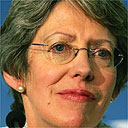
NHS managers are to consider capping GPs' pay as they negotiate changes to their contracts, it was confirmed today.
The news came hours after the health secretary, Patricia Hewitt, said that, with hindsight, she wished GPs' earnings had been capped.
Last November, it emerged that the average pay for a GP had risen to £106,000 following the government's introduction of a new pay contract in 2004.
The deal, which rewards GPs for providing certain services rather than simply according to the numbers of patients on their books, was designed to give practices additional funds to invest in patient care.
However, there have been qualms about the extent to which profits have grown, soaring by 30% in the last year.
Some commentators have argued that the GP contract could become a symbol of the Blair government "throwing money at public services" and failing to get good enough improvements.
Ms Hewitt, who became the health secretary in May 2005, told BBC News that, with hindsight, she wished GPs' earnings had been capped.
She said the extent to which doctors would respond to performance related pay had not been anticipated.
Some doctors said she was "denigrating" GPs, while the Liberal Democrats said it was clear the government had made a "hash" of GP contracts.
However, the NHS Employers lead negotiator, Barbara Hakin, welcomed the notion of a cap and said her team would start work next week to determine whether it would be viable.
"That [a cap on profits] is a very interesting idea and one we should certainly look at," she told BBC Radio 4's World at One.
"I don't think the doctors' negotiators will be very keen on that idea, but I think we need to look at it because, clearly, the public are anxious that this isn't reasonable.
"Now that the secretary of state has made that suggestion, the Department of Health, working with the team at NHS Employers, will be starting to look at that next week."
Talks on revising the GP contract have stalled, with doctors' representatives demanding an uplift in line with inflation but employers saying any extra cash must be linked to improvements in services.
Ms Hewitt said the criteria for performance-related pay had been made "more challenging".
Speaking to the BBC News website about the 2004 contract, she said: "I think if we anticipated this business of GPs taking a higher share of income in profits, we would have wanted to do something to try to ensure that the ratio of profits to the total income stayed the same and therefore more money was invested in even better services for patients.
"When we were negotiating the GP contract, we had GPs taking early retirement and very large numbers of new doctors refusing to become GPs.
"Now it is quite true that neither the government or the BMA [British Medical Association] anticipated how much GPs would do in response to performance-related pay.
"GPs in England are doing more for their patients in terms of prevention and giving support for long-term conditions than almost any country in the developed world."
John Reid, the home secretary, was the health secretary in 2004, although the GP contract had already been signed off by his predecessor, Alan Milburn, who was health secretary between October 1999 and June 2003.
Laurence Buckman, the deputy chairman of the BMA's GPs committee, was unhappy with Ms Hewitt's comments.
"Is the secretary of state saying she wishes GP practices had not performed so well on quality targets thereby improving the delivery of top quality care?" he told the BBC.
"The government signed off the contract which ties income to quality performance. She should be proud of the achievements of general practice, not denigrating doctors for delivering quality patient care."
Opposition parties said the government's poor handling of pay negotiations had contributed to the deficits the health service was currently facing.
"The government underestimated the number of points GPs would get for treating patients, which in a way is really sad because it means the government underestimated the good job that GPs do," the Conservative shadow health secretary, Andrew Lansley, said.
"For Patricia Hewitt to distance herself from the GP contract is a show of how low her own performance has sunk."
The Liberal Democrat health spokesman, Norman Lamb, told the BBC: "The government has clearly made a hash of negotiating the GP pay contracts.
"It is not helpful for them to admit incompetence after the event when the problems in the NHS are already mounting. We need an urgent review into the government's approach to such pay agreements in the NHS."

